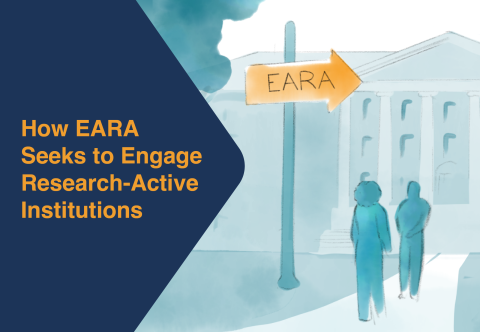
The NIH Engagement and Access for Research-Active Institutions (EARA) initiative is a collaborative endeavor to broaden the participation of Research-Active Institutions (RAIs) in the NIH funding ecosystem. EARA is tied to NIH’s goal to facilitate access to its resources to ensure equity in the grant application process, as outlined in the Fiscal Years 2023–2027 NIH-Wide Strategic Plan for DEIA.
Through EARA, NIH aims to strengthen RAI awareness of, and ability to utilize, NIH resources and funding opportunities, enhance information-sharing and collaboration for RAI engagement and support across NIH Institutes, Centers, and Offices (ICOs), and build relationships between NIH and RAIs and broaden participation of RAIs in the NIH ecosystem.
NIH introduced EARA in November 2023 in response to a recommendation from UNITE. The COSWD team is leading EARA with partners and collaborators across NIH.
Why Research-Active Institutions?
Enabling full, innovative contributions to the biomedical and behavioral research enterprise requires that a broad and diverse range of institutions have the appropriate foundation for success.
RAIs are institutions that meet the following criteria:
- Have a documented mission to serve populations underrepresented in biomedical and behavioral research—including populations identified in the Notice of NIH’s Interest in Diversity.
- Award degrees in the health professions or the sciences related to health or in STEM fields, including social and behavioral sciences.
- Have received an average of no more than $25 million (total costs) of NIH Research Project Grant support for the past three fiscal years.
NIH recognizes the important role RAIs play in supporting scientific research and providing health care in underserved communities. RAIs are uniquely positioned to engage these populations in research and support the translation of research advances into culturally competent, measurable, and sustained improvements in health outcomes, but often lack the research infrastructure and capacity to conduct cutting-edge, health-related research.
I encourage you to watch our November 2023 seminar for a discussion of RAIs, including how they cultivate diverse perspectives in science and contribute to scientific innovation and productivity.
EARA’s Initial Steps
Among our initial EARA activities, we have begun a pilot project with a group of approximately 50 RAIs. Through this endeavor, we seek to better understand RAIs’ research needs and identify strategies to enhance their knowledge of existing NIH funding opportunities. In addition, the project will facilitate communication and relationships between RAIs and ICOs with related research interests.
I look forward to sharing more about the EARA pilot project. In the meantime, please explore the recently updated EARA web page and its resource section for RAIs.

